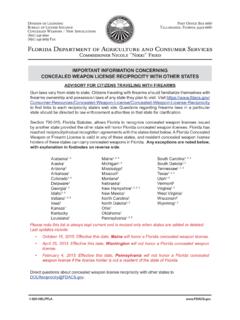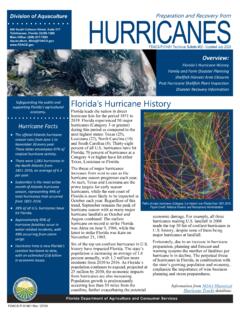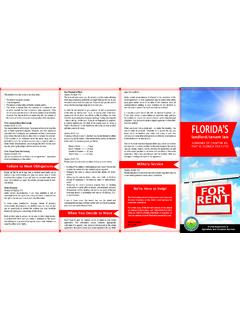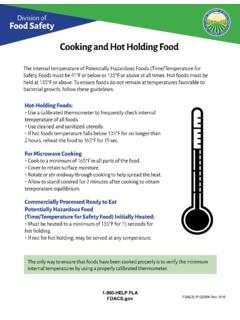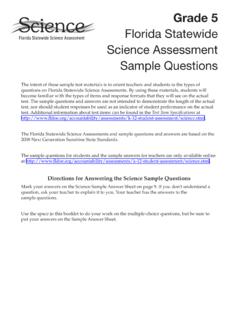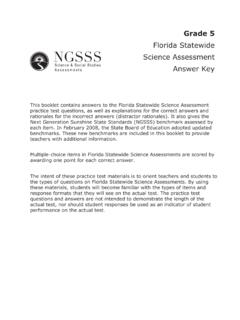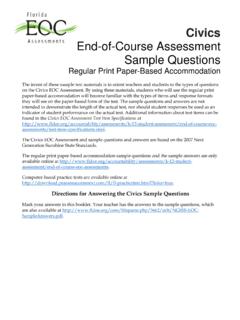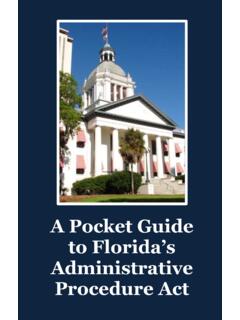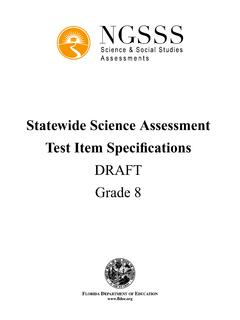Transcription of LIQUEFIED PETROLEUM GAS LAWS AND RULES - Florida …
1 LIQUEFIED PETROLEUM GASLAWS AND RULESDIVISION OF CONSUMER SERVICES OCTOBER 2020 EDITIONN icole Nikki Fried, Commissioner Florida S LP GAS laws AND RULES TABLE OF CONTENTS PAGE TITLE 1 Table of Contents 3 What are LIQUEFIED PETROLEUM Gases?
2 3 History of LP Gas Regulation in Florida 4 Florida Propane Gas Education, Safety and Research Act 4 Florida LIQUEFIED PETROLEUM Gas Advisory Board 5 Division of Consumer Services Contact Information 6 LP Gas License Categories and Requirements 7 Examination Information 8 Index to Chapter 527, Florida Statutes, Sale of LIQUEFIED PETROLEUM Gas 9 Chapter 527, Florida Statutes 18 Index to Chapter 5J-20, Florida Administrative Code 19 Chapter 5J-20, Florida Administrative Code, LIQUEFIED PETROLEUM Gas Inspection 29 Subject Index of LPG laws and RULES 30 Information Documentation of Training 30 Information Regulatory Deadlines 30 Resources (Contacts and Websites for More Information) 31 Hurricane Preparedness If you have a question concerning Florida s LP gas laws or RULES , or the national safety codes adopted by rule, please contact the Bureau of Compliance (LP Gas) at (850) 921-1600 or the Bureau of Standards at (850) 921-1570.
3 PLEASE NOTE: Recent changes to Chapter 527, Florida Statutes, and anticipated changes to Rule Chapter 5J-20, Florida Administrative Code, are reflected in this document. Rule Chapter 5J-20, Florida Administrative Code, is currently undergoing revisions through rulemaking. The Department anticipates these rule changes becoming effective in November of 2020. Every attempt has been made to accurately reproduce Chapter 527, Florida Statutes, and Rule Chapter 5J-20, Florida Administrative Code, in this publication; however, this should not be regarded as an official copy of either regulation.
4 * All references to NFPA 58 are to the most recent adopted version. In the event of a conflict between codeprovisions shown in this booklet and those reflected in the most current adopted version of NFPA 58, the currentadopted version of NFPA 58 shall 1 Page 2 left blank intentionally Page 2
5 WHAT ARE LIQUEFIED PETROLEUM GASES?
6 LIQUEFIED PETROLEUM gases when sold are predominantly comprised of the hydrocarbons propane or butane, but most commonly a predominant mixture of both. Other components such as propylene, butylenes and/or other hydrocarbons may also be present in the product but are relegated to small percentages and not the primary component. "Propane", "LP gas", "bottled gas" and "Butane" are some of the names used to identify LIQUEFIED PETROLEUM gases. Compressed natural gas (CNG) and LIQUEFIED natural gas (LNG) are not considered LIQUEFIED PETROLEUM gases as covered throughout this document.
7 All LIQUEFIED PETROLEUM gases are safe and efficient energy sources when used in accordance with proper safety and handling procedures. These gases are used in a variety of ways, including home heating, cooking, as a motor fuel, and in a variety of industrial applications. AVERAGE PROPERTIES OF COMMERCIAL PROPANE Pounds Per Gallon BTU Per Gallon BTU Per Pound BTU Per Cubic Ft. Vapor at 60 F 2,488 Cubic Ft. Vapor per Gallon at 60 F Cubic Ft. Vapor per Pound at 60 F Specific Gravity of Vapor Specific Gravity of Liquid .504 Boiling Point -44 FIgnition Temperature 920 -1120 F Limits of Flammability (lower/upper) kwh per Gallon of Propane The unique characteristics of LP gas require a high level of expertise and regulation through special codes, laws and regulations.
8 Propane is normally stored in a pressurized vessel as both a vapor and a liquid under moderate pressure. Under ambient conditions, it is colorless, tasteless, odorless, and non-toxic gas. It is produced through the oil refining process or is stripped out of natural gas. However, since LP gas vapors are heavier than air, they can pocket or collect in low areas (unlike natural gas) and go undetected unless an odorant is added to serve as a warning for its presence. The odorant most commonly used is ethanethiol (also known as ethyl mercaptan) and has a very distinct smell thus allowing persons to easily detect its presence and may warrant a search for the source of release.
9 LIQUEFIED PETROLEUM gases when released from a pressurized container or system will expand to a volume approximately 270 times greater than when LIQUEFIED . This translates to a viable energy source that can be easily stored in a manageable volume and thus transportable due to the energy density when in the liquid state. It is these unique characteristics that make enforcement of applicable safety requirements essential for protection of the public against loss of property, health, and life due to propane-related accidents. HISTORY OF LP GAS REGULATION IN Florida In 1947, the first laws governing the sale of LIQUEFIED PETROLEUM gas were enacted by Florida s legislature in response to the industry s recognition of the need for uniform regulation of this product in the state.
10 The original law was contained in Chapter 526, Florida Statutes, and entitled Sale of Liquid Fuels. In 1961, Chapter 527, Florida Statutes, entitled Sale of LIQUEFIED PETROLEUM Gas, was created to govern the safe storage, transportation, sale, and use of LIQUEFIED PETROLEUM gas in Florida . Until 1979, LIQUEFIED PETROLEUM gas regulations were administered by the Bureau of LP Gas within the Division of State Fire Marshal, Department of Insurance and Treasurer. In 1979, the Legislature elevated this office to division status with the enactment of Section , Florida Statutes.



